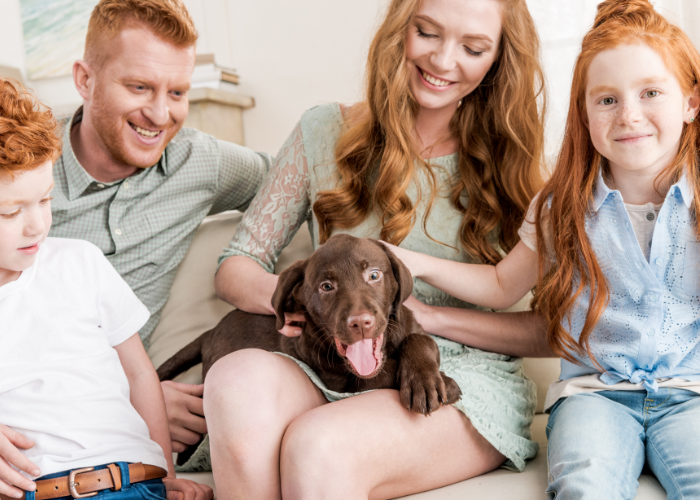
What Is the Best Age to Get a Puppy? (2023)
What Is the Best Age to Get a Puppy?
Are you considering adding an adorable, furry member to your family? You might be wondering, “What is the best age to get a puppy?” This seemingly simple question has many factors to consider, such as socialisation, weaning, legal requirements, and personal circumstances. Don’t worry, we’ve got you covered! In this blog post, we’ll dive deep into these factors to help you make the best decision for you and your future pup.
Short Summary
- Adopt puppies between 8-12 weeks old for socialisation, bonding with humans, and health benefits.
- Consider breed characteristics and your lifestyle when deciding to adopt a puppy.
- Consult a vet about the best time to spay/neuter your pup for their long term well being.
Ideal Puppy Adoption Age: The Facts
So, when is the right age to bring a new pup home? Most experts agree that the ideal age to adopt a puppy is between 8-12 weeks old. This time period is crucial for the pup’s healthy development and future behaviour. Adopting them too early can lead to difficulty socialising with adult dogs and other pets, while adopting them after 16 weeks might require extra effort in training and socialisation.
During these formative weeks, puppies learn essential social skills and behaviours from their littermates and mothers. This experience will shape their confidence and behaviour as they grow into adults. Socialising puppies with both other animals and humans is vital, and their ability to bond with humans is especially important between 7-8 weeks old.
Socialisation Benefits
Exposing puppies to as many new people, animals, stimuli, and environments as possible in a safe and non-overstimulating way will help them learn essential social skills and prevent potential behaviour problems in the future. Good breeders play a vital role in this process by introducing puppies to various experiences such as car rides, crate time, different noises, surfaces, and other dogs, helping make future training sessions more effective.
One crucial aspect of socialisation is learning impulse control, biting inhibition, and other behaviours from their mother and littermates. This process typically occurs between 6 to 12 weeks of age. Inadequate socialisation during this time can result in aggressive behaviour, low confidence, anxiety, and fear, making it difficult for the new puppy to adjust to their new home.
Bonding with Humans
Forming a bond with humans is essential for a puppy’s emotional and social growth. It helps create a stronger and healthier relationship between the pup and their owner. Most pups are ready to start building relationships with their human family around 7-8 weeks old. This is the ideal time for puppies to bond with their new human family, ensuring a strong connection throughout their life.
Although puppies can bond with humans at any age, establishing a strong connection early on is crucial for their emotional well-being. Waiting too long to adopt a puppy can make it challenging for them to form a close bond with their new family, which could lead to behavioural issues and a less fulfilling relationship for both the pup and their new human family.
Weaning Process and Puppy Health
Before bringing a new puppy home, it’s essential to ensure that they are fully weaned from their mother’s milk and eating solid food, such as puppy food. This usually occurs between 3-5 weeks old. Complete weaning is crucial for puppies’ health and well-being, as it helps them transition to their new home more easily and reduces the risk of diseases and other health issues.
Legal and ethical considerations also come into play when weaning puppies. Breeders need to ensure they are following their state’s regulations and prioritising the well-being of their puppies. Incomplete weaning can result in health and behavioural issues down the line, which is why it’s essential to adopt a puppy only after they have been fully weaned.
Mother’s Milk to Solid Food
The weaning process involves transitioning puppies from their mother’s milk to solid food, typically between 3-5 weeks old. Ensuring a puppy is fully weaned before adoption prevents potential health and behavioural issues.
If puppies don’t have the chance to suckle for both food and comfort, they may show signs of insecurity when they’re older. It’s essential for breeders to facilitate a smooth transition from mother’s milk to solid food, allowing puppies to develop good eating habits and become more independent.
Importance of Complete Weaning
Complete weaning is essential for puppies as it helps them transition from their mother’s milk to solid food gradually, build good eating habits, and become more independent. This process plays a crucial role in their growth and development and prevents malnourishment.
Incomplete weaning can result in various behavioural, mental, and physical issues later in the puppy’s life, emphasising the importance of waiting until the puppy is fully weaned before adopting them. By ensuring that your new puppy has been completely weaned, you can help set them up for a healthy and happy life with their new family.
Legal Requirements and Ethical Considerations
Most states require puppies to be at least 8 weeks old before they can be adopted. Nonprofit animal shelters or humane societies are usually exempt from these legal rules on puppy sales. It’s essential to follow state regulations when adopting a puppy to guarantee the puppy’s well-being and safety.
When it comes to breeding, the welfare of their puppies should be the top priority for ethical breeders. They have a responsibility to make sure their puppies are receiving proper care, socialisation, and gradual exposure to new experiences. By adhering to legal and ethical guidelines, breeders can ensure that their puppies have the best possible start in life.
State Regulations
State regulations for adopting a puppy vary, but the minimum age is typically at least 8 weeks old and weaned before going to their new homes. These regulations are in place to ensure the puppy’s well-being and safety.
It’s essential to research your state’s regulations before adopting a puppy to ensure compliance with the law. By following these rules, you can help protect the health and well-being of your new furry family member and set them up for a successful transition into your home.
Breeder Responsibilities
Breeders have a responsibility to provide proper care, socialisation, and gradual exposure to new experiences for their puppies. This helps ensure that the puppies are well-prepared for a puppy’s life in their new homes and reduces the likelihood of behavioural issues down the line.
Ethical breeders prioritise the welfare of their puppies, taking the time to ensure that they are fully weaned, socialised, and exposed to new experiences before letting them go to their new homes. By adhering to these responsibilities, breeders can ensure that they are providing the best possible start for their puppies, setting them up for a happy, healthy life with their new families.
Training and Adjusting to a New Home
Training and adjusting to a new home is easier for puppies adopted between 8-12 weeks old, as they are more receptive to toilet training and socialising with other pets. Puppies brought home within this age range are more likely to successfully learn toilet training and adjust to their new environment, making their transition smoother and more enjoyable for both the pup and their new family.
Toilet training is an essential part of raising a well-behaved puppy, and the best time to start this process is between 8 and 12 weeks old. Socialising with other pets is also crucial during this time, as it helps the puppy develop social skills, learn how to interact with other animals, and boost their confidence.
Toilet Training
Toilet training is an essential aspect of raising a happy, well-behaved puppy. Establishing a routine, providing positive reinforcement, and staying consistent are all crucial components of successful toilet training. The ideal age range for toilet training is between 8 and 12 weeks old, as puppies are more likely to learn and retain these skills during this time.
Toilet training can be challenging, as it requires consistency, patience, and an understanding of the pup’s needs and signals. However, by starting early and following a structured approach, you can set your puppy up for success and help them develop good bathroom habits that will last a lifetime.
Socialising with Other Pets
Socialising your puppy with other pets should be done gradually and in a controlled environment. Introduce your pup to other pets in a safe, enclosed area and let them get familiar with each other’s presence. If the interaction goes well, you can slowly increase the amount of time they spend together. This will help your puppy develop social skills, learn how to interact with other animals, and boost their confidence.
The best age range for socialising puppies with other pets is between 8 and 16 weeks old. During this time, puppies are more open to new experiences and better equipped to adapt to their new environment, making the process of socialising with other pets more successful and enjoyable for both you and your pup.
Breed-Specific Factors and Adoption Timing
When determining the best time to adopt a puppy, it’s important to consider breed-specific factors and personal circumstances. Some breeds may require additional time with their littermates or breeders before adoption. Factors such as size, temperament, energy level, and grooming needs should also be taken into account to ensure the pup is a perfect fit for your lifestyle and home.
Your personal schedule and lifestyle should also be considered when deciding when to adopt a puppy. Make sure you can dedicate enough time to the pup’s needs, including exercise, grooming, and training. By taking the time to consider breed-specific factors and your personal circumstances, you can ensure a successful and enjoyable adoption experience for both you and your new furry friend.
Breed Considerations
Some breeds may require additional time with their littermates or breeders before adoption, depending on their specific needs and developmental stages. It’s essential to research and understand these breed-specific factors before adopting a puppy, as it can affect the best time to bring your new pup home.
When considering breed factors, it’s crucial to think about adult size, temperament, energy level, and potential health issues of the breed. This information can help you make an informed decision about when to adopt a puppy and ensure that you are prepared for the pup’s growth and development throughout their life.
Personal Circumstances
Before adopting a puppy, it’s important to consider your personal circumstances, such as your living situation, work schedule, financial stability, and ability to provide for the dog’s needs. This will help you determine the best time to adopt a puppy and ensure a successful transition into your home.
Think about the size of your dog home, the people living there, and how much time you can spend with the pup. Consider the exercise and grooming needs of the breed you’re interested in and whether your lifestyle and abilities match up.
By taking your personal circumstances into account, you can make the best decision for both you and your future dog.
Spaying and Neutering: When Is the Right Time?
The right time to spay or neuter a puppy depends on factors such as breed, weight, and behaviour. Consulting with a veterinarian is essential for personalised advice on the best time to spay or neuter your pup. Spaying and neutering puppies can help prevent health issues, lower the chances of theft, stop unexpected litters, and even improve their behaviour.
It’s important to feel confident about the breeder’s choices regarding weaning, socialisation, and when they’ll let you take the pup home. Ensuring that your new dog has been spayed or neutered at the appropriate time can help set them up for a healthy, happy life with their new family.
Male Puppy Neutering
Male puppies are typically neutered between 6-9 months old. The exact timing may vary based on individual factors such as breed, size, and overall health. Neutering male puppies can help prevent unexpected litters, lower the chances of testicular cancer and other health issues, and reduce aggressive and roaming behaviour.
It’s always best to consult with a veterinarian to determine the best time to neuter your male puppy, as they can provide tailored advice based on your pup’s specific needs and circumstances. By neutering at the appropriate time, you can help ensure their long-term health and well-being.
Female Puppy Spaying
Female puppies are usually spayed between 6-9 months old. The timing is dependent on factors such as their first heat cycle and overall health. Spaying female puppies is beneficial for their health and can help avoid unwanted litters. It can reduce the risk of uterine or ovarian cancer, breast cancer, unwanted pregnancies, and infections of the uterus. Additionally, it can lessen aggression and increase their lifespan.
As with male puppies, it’s essential to consult with a veterinarian for personalised advice on the best time to spay your female puppy. By spaying your female puppy at the appropriate time, you can help ensure their long-term health and well-being.
Summary
In conclusion, the best age to adopt a puppy is between 8-12 weeks old, as this is when they benefit most from socialisation and bonding with humans. It’s essential to ensure they are fully weaned from their mother’s milk and eating solid food before adoption. Research your state’s regulations and consider breed-specific factors and personal circumstances to make the best decision for you and your future dog. Finally, consult with a vet for personalised advice on spaying and neutering your puppy. By taking all these factors into account, you can set your new furry family member up for a happy, healthy life with you.
Frequently Asked Questions
Is 12 weeks too old to get a puppy?
11 to 12 weeks is ok for some breeds, but larger puppies should go to their new homes at 9-10 weeks.
12 weeks is too old for most breeds.
Should I get my puppy at 8 weeks or 12 weeks?
Eight weeks of age is the recommended age for puppies to go to their new home.
Purchasing from a reputable breeder who doesn’t separate puppies too early is important.
What age is hardest to have a puppy?
Raising a puppy during its adolescent stage (usually between 8-18 months old) can be the most difficult. This is because your pup is producing hormones which can change their behaviour, and they may start developing larger size behaviours like pulling on the leash.
At this stage, it is important to be consistent with your pup’s training and to provide them with plenty of exercise and mental stimulation. This will help them stay focused and to learn the behaviours you want them to learn.
Why is socialisation important for puppies?
Socialisation is important for puppies as it enables them to learn how to interact with other animals, develop social skills and boost their confidence.
It helps them to become more comfortable in different environments and to understand the rules of the pack. It also helps them to learn how to respond to different situations and to develop their own personalities.
What is the role of breeders in the socialisation process?
Breeders play an essential role in socialisation by exposing puppies to various experiences, such as car rides, crate time, different noises, and surfaces.
These experiences help puppies become comfortable with their environment and build confidence. They also help puppies learn how to interact with people and other animals. Socialisation is an important part of a puppy’s development and should not be overlooked.
It is.






